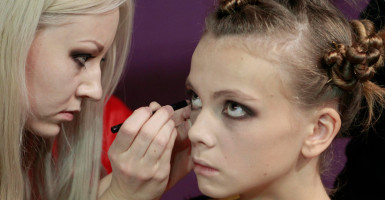Makeup artists in 33 states have longer training requirements for state licenses than emergency medical technicians.
“When the state says the process for becoming a licensed makeup artist should be more rigorous than it is for jobs involving life-or-death situations, something is seriously wrong,” the law firm Institute for Justice reported.
States that regulate makeup artists include Nevada, where it takes over eight times as long, and New York, where it take four times as long to complete required makeup artist training than EMT training.
A makeup artist in New York must be licensed through the state as an aesthetician (a person who specializes in skin care, like facials and waxing), which requires 600 hours of training along with passing state exams. An EMT license in New York requires between 140 and 170 hours of training, Nikki Rudd with WHEC News 10, an NBC News affiliate in Rochester, N.Y., reported.
“I’m a mom—two kids, I work,” Ashley Knight, a makeup artist who went to school in New York City to get certified, told WHEC News 10 in February. “I love what I do, but for me to go back to school and do 600 hours and work and be a mom—it’s just too much.”
A total of 36 states require makeup artists to be licensed. And 33 of these states require more training days to get licensed as a makeup artist than as an EMT.
“An occupational license is essentially a government permission slip to work,” Dick Carpenter, Institute for Justice director of strategic research, told The Daily Signal. “The people who want to work in a particular occupation, rather than being able to freely hang out their shingle and attract a customer, they have to spend their time earning a license rather than earning a living.”
A 2012 Institute for Justice study on state occupational licensing laws, called “License to Work,” found that in New York, makeup artists must spend 140 days in training. However, an EMT spends 35 days in training.
“What we found was, makeup artists are widely regulated across the states, New York included, and that to enter this occupation, it’s very frequently pretty burdensome,” Carpenter said.
According to the Institute for Justice’s research, makeup artists ranked 40th for most burdensome licensing requirements among 102 occupations. The occupation also ranked as the 22nd most heavily regulated occupation.
Carpenter says there is a “stark comparison” between licensing for a makeup artist versus an EMT. “Emergency medical technicians literally hold the lives of people in their hands,” he said.
“The stark comparison here is when we think about the threat to public health and safety of one type of occupation to another, it really calls into question the need for licensing of particular occupations or the severity of the burden associated with the licensing.”
Joan Lincoln, who was a makeup artist for more than 20 years in Rochester, N.Y., was never licensed, WHEC News 10 reported.
“A makeup artist to me is like an artist who paints or someone who does woodworking,” Lincoln told the news station. “I don’t know that a license is truly necessary for that type of work.”
About 25 percent of people in the United States workforce are in occupations that require licenses at the state level, according to a White House report from last year. This is up from less than 5 percent of the workforce in the 1950s.
From state to state in different occupations, there are “vast disparities in what’s required to do the exact same job,” Carpenter says.
In Florida, the state with the most burdensome licensing requirements for makeup artists, licensing training for makeup artists takes a little over eight times as long as training for EMTs. In Iowa, ranked 23rd (near New York’s 26th rank) in terms of burdensome licensing requirements for makeup artists, it takes five times as long to become a makeup artist as it does to become an EMT.
“It makes no sense to license makeup artists,” Salim Furth, a research fellow in macroeconomics in the Center for Data Analysis at The Heritage Foundation, told The Daily Signal.
Furth added:
Millions of people in New York put makeup on themselves every day. This licensure law takes a skill that is already common, especially among women, and puts it beyond their reach as a way of making income. The government should respect the competence of entrepreneurs and the savvy of consumers instead of patronizing them.
































